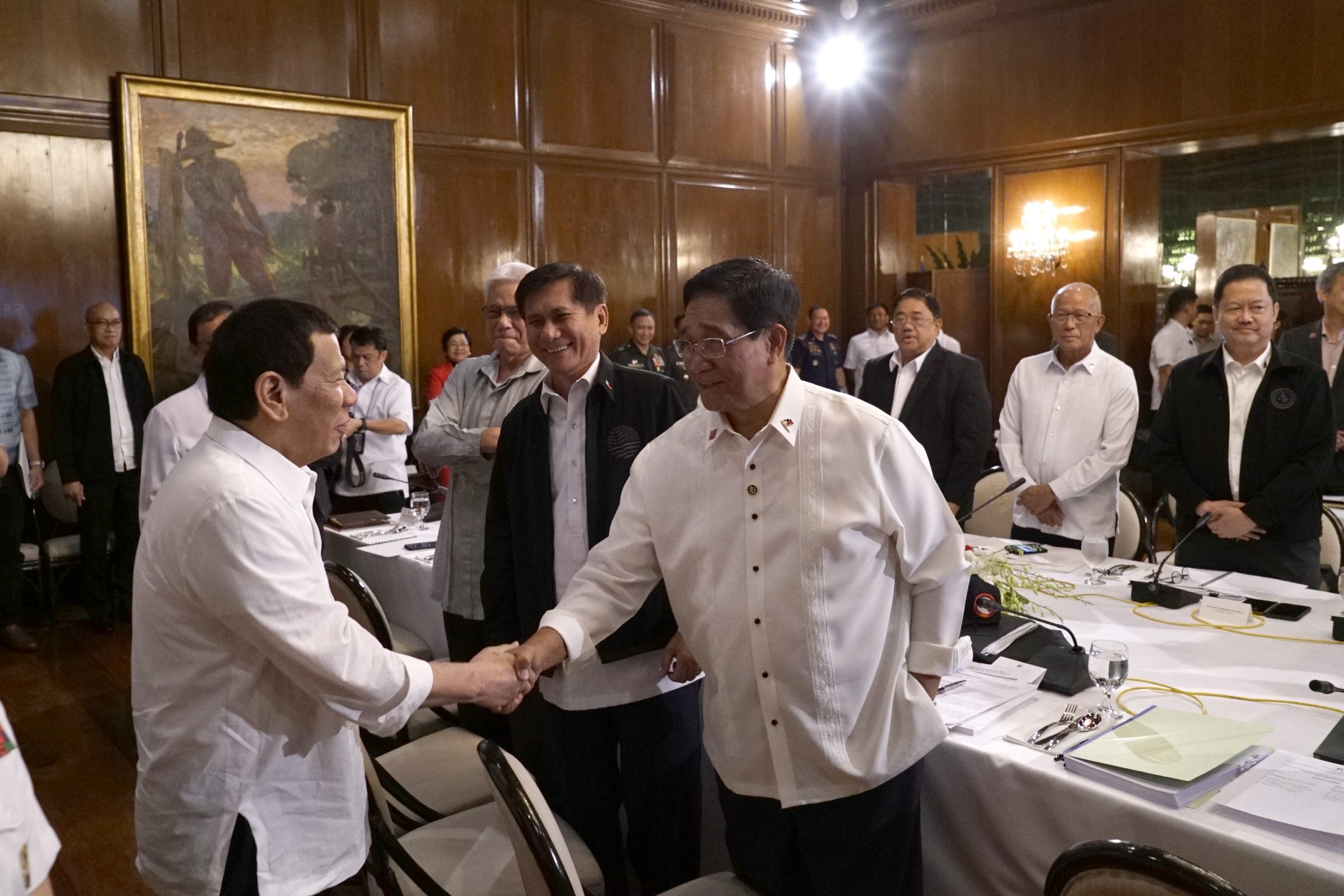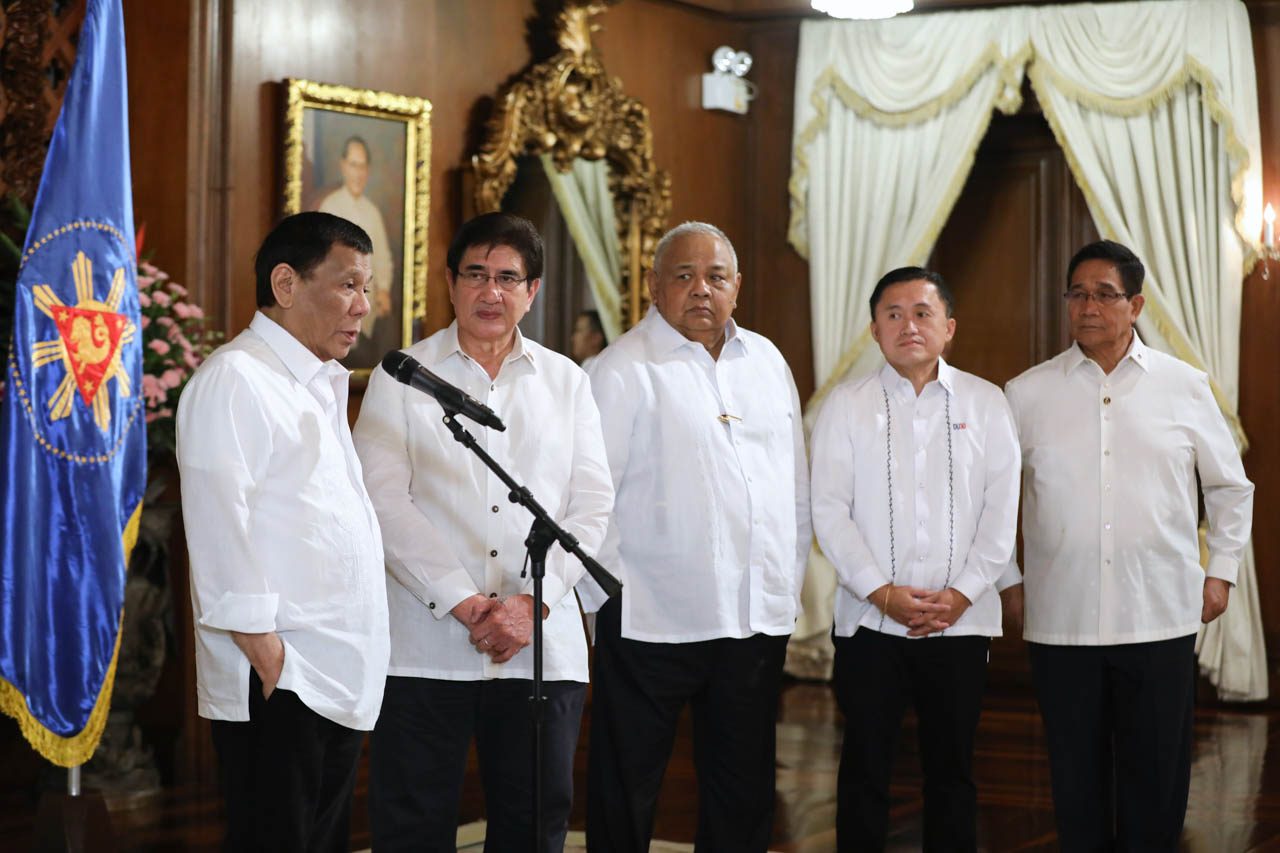SUMMARY
This is AI generated summarization, which may have errors. For context, always refer to the full article.

MANILA, Philippines – Former information and communications technology undersecretary Eliseo Rio Jr has claimed that it was National Security Adviser Hermogenes Esperon Jr who convinced President Rodrigo Duterte to remove him from the government by accepting his “forgotten” resignation.
In an interview with Rappler on Tuesday, June 9, Rio detailed the circumstances of his resignation last January, Duterte’s refusal to accept it at the time, and the Chief Executive’s “sudden” decision to accept it in mid-May.
Esperon has not responded to Rappler’s requests for comment on the claim and declined to take calls to get his side.
Duterte told him to stay
At the tail-end of January, Rio had offered to resign because he felt he was being sidelined by new Information and Communications Technology Gregorio Honasan II, who had more trust in the people that he had just brought into the department. Rio, in contrast, had been in the department since 2016 and had even taken over its leadership in 2017.
Rio’s resolve to resign was bolstered by his disapproval of how Honasan’s office made use of the department’s funds for confidential and intelligence expenses.
But Duterte didn’t accept Rio’s resignation then, and even ordered him to patch things up with Honasan.
“I was called to Malacañang. We had a long talk with the Executive Secretary (Salvador Medialdea). I pointed out my reasons why I’m resigning and the Executive Secretary informed me at the time that, ‘No, the President doesn’t want you to resign and you have to find ways to make amends with Secretary Honasan.’ And that’s what I did in compliance with the orders of the President,” said Rio.
“‘He will not accept your resignation, Go back to the DICT because he needs you there,'” Medialdea also supposedly told Rio.
Rio resumed his work in DICT and resolved his differences with Honasan.
Mere days after Rio’s talk with Medialdea, Honasan gave him supervision over the DICT’s two biggest programs – the National Broadband Backbone and Free Wifi/Internet in Public Places programs.
Because of these events, Rio thought his offer to resign was “forgotten.”
Medialdea, Honasan ‘surprised’ by Duterte decision
Rio said he was not the only one caught off-guard by Duterte’s about-face.
Early morning on May 22, he got a call from Medialdea.
Sounding “apologetic,” Medialdea told Rio that Duterte had accepted his resignation and that even he had not seen this coming.
“He was quite apologetic – ‘Sir, I don’t know about this.’ So somebody or someone manipulated the acceptance of the President of my resignation and even the Executive Secretary didn’t know; even Greg Honasan didn’t know. They were all surprised,” said Rio.
Asked who he thought was behind it, Rio said, “Of course I was not behind StaySafe and the sponsor of StaySafe is Secretary Esperon. You don’t need to be a detective to know that; who can be your probable cause.”
Rio also said that Esperon might have “given the impression” to Duterte that Rio wanted to “rest.”

StaySafe is the Duterte government’s official health-monitoring and contact-tracing platform. It was developed by a private tech firm, Multisys Technologies Corporation. (READ: ‘Borderline spyware’: IT experts raise alarm over Duterte admin contact-tracing app)
It got the government’s backing after a series of April meetings in which StaySafe and other apps were presented to the Inter-agency Task Force on Emerging Infectious Diseases (IATF-EID).
Other app developers and IT experts helping the government at the time were surprised when StaySafe was suddenly chosen to be the official contact-tracing platform.
Multisys CEO David Almirol Jr himself said in an interview with Rappler that he was also surprised by the quick acceptance of the government.
Rio has become the most vocal critic of StaySafe, citing lack of proper vetting of its technology and data privacy measures. Rio had also been smarting from what he felt was the task force’s disregard of a centralized coronavirus data warehouse he had put together with private IT experts and the United Nations Development Programme (UNDP).
Esperon’s links with Multisys CEO
Esperon’s links to Almirol go back to the start of the Duterte administration.
It was through Esperon that Rio first met Multisys CEO David Almirol Jr sometime in 2016. At that meeting, the National Security Adviser strongly recommended that DICT take in Almirol as a consultant.
“Then [DICT Secretary Rodolfo] Salalima and I were called to the office of Secretary Esperon and there we were introduced to Almirol, with strong recommendation to take in Almirol as a consultant of DICT,” said Rio.
Salalima expressed openness to the idea but did not make any commitment.
Rio said that Esperon and Almirol were working on “some technical intelligence surveillance projects” at the time and were hoping for DICT support.
Almirol, in an interview with Rappler, confirmed that the meeting took place but said it was a chance meeting and not organized by Esperon just to present him as a possible DICT consultant.
The tech executive also denied working on “surveillance” projects for Esperon.
Almirol said he signed on in 2017 as a consultant for the National Security Council (NSC), which Esperon leads as director general. He helped the council with work related to cracking down on fake documents, fixing the office’s internal systems and inventory. But he declined a renewal of the role when the designation lapsed.
Esperon is among Duterte’s most trusted advisers and was among the retired generals who urged him to run for president in 2016. Esperon was active in Duterte’s campaign, functioning as head of security for the then-candidate’s sorties and events.
Another angle
Yet despite Rio’s claims about Esperon, could the reason behind his removal have more to do with the man who replaced him – Ramon “RJ” Jacinto?
Jacinto’s appointment as Rio’s replacement was signed on the same day Medialdea called Rio about Duterte’s decision to accept his resignation.
Jacinto, who was previously Duterte’s adviser on ICT matters, was pushing for a policy that would give the government the power to choose two companies to build cell towers and share those towers to Globe, PLDT, and new telco player Dito Telecommunity.
Rio had staunchly opposed this, saying it violated the government’s contracts with telcos and was anti-competitive.
Jacinto was brought into DICT by Malacañang, not by Honasan. Honasan had wanted to appoint DICT undersecretary Manny Caintic to take over Rio’s post and was also surprised when told Jacinto was coming in.
When asked if he thought Jacinto’s entry was the reason for his removal, and not StaySafe or Esperon, Rio said he doubted it.
He reasoned that it might be too late for Jacinto to make major changes to the common cell tower program since DICT has already signed memoranda of understanding with 24 tower companies and 4 already have contracts with telcos.
Still, as DICT undersecretary, Jacinto wields more operational power over the department’s programs than as presidential adviser on ICT. – Rappler.com
Add a comment
How does this make you feel?
There are no comments yet. Add your comment to start the conversation.